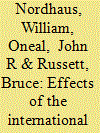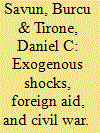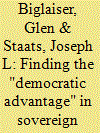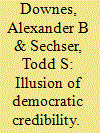|
|
|
Sort Order |
|
|
|
Items / Page
|
|
|
|
|
|
|
| Srl | Item |
| 1 |
ID:
114186


|
|
|
|
|
| Publication |
2012.
|
| Summary/Abstract |
While extensive scholarship has shown that it is possible to maintain global economic openness after hegemony, economic liberalization is still thought to be unlikely prior to hegemonic ascent. This assumption is based on the conventional narrative that Great Britain began lowering its trade barriers in the 1820s as it began its hegemonic ascent. This article shows that Britain began pursuing an open trading structure in the 1780s-in precisely the multipolar world that hegemonic stability theorists claimed would be least likely to initiate the shift. This change in commercial strategy depended crucially on the intellectual conversion of a key policymaker-the Earl of Shelburne-from mercantilist foreign economic policy to Adam Smith's revolutionary laissez-faire liberalism. Using the case of "the world's most important trading state" in the nineteenth century, this article highlights the importance of intellectuals-as well as their ideas-in shaping states' foreign policy strategies. It also provides further evidence of key individuals' significance and their decisions at "critical junctures."
|
|
|
|
|
|
|
|
|
|
|
|
|
|
|
|
| 2 |
ID:
114189


|
|
|
|
|
| Publication |
2012.
|
| Summary/Abstract |
We consider the influence of countries' external security environments on their military spending. We first estimate the ex ante probability that a country will become involved in a fatal militarized interstate dispute using a model of dyadic conflict that incorporates key elements of liberal and realist theories of international relations. We then estimate military spending as a function of the threat of armed interstate conflict and other influences: arms races, the defense expenditures of friendly countries, actual military conflict, democracy, civil war, and national economic output. In a panel of 165 countries, 1950 to 2000, we find our prospectively generated estimate of the external threat to be a powerful variable in explaining military spending. A 1 percentage point increase in the aggregate probability of a fatal militarized dispute, as predicted by our liberal-realist model, leads to a 3 percent increase in a country's military expenditures.
|
|
|
|
|
|
|
|
|
|
|
|
|
|
|
|
| 3 |
ID:
114187


|
|
|
|
|
| Publication |
2012.
|
| Summary/Abstract |
This article analyzes the social potential of regional integration processes by using the example of European integration. Recent case law from the European Court of Justice has led some observers to argue that judicial decisions increasingly provide European politics with a "Polanyian" drive. We test this claim by distinguishing three dimensions to European economic and social integration: market-restricting integration, market-enforcing integration, and the creation of a European area of nondiscrimination. We also identify two forms of integration that have different speeds, scopes, and potentials: political integration and judicial integration. The evidence shows that the EU has come closer to Hayek's vision of "interstate federalism" than is usually warranted because market-enforcing integration and European nondiscrimination policies have asymmetrically profited from "integration through law." The opportunities for international courts to push ahead market-enforcing integration increase as the participants of regional integration processes become more diverse. In such "Hayekian" constellations, individual rights are increasingly relocated to the central level, at the cost of subordinating the decentralized capacity for solidarity and interpersonal redistribution.
|
|
|
|
|
|
|
|
|
|
|
|
|
|
|
|
| 4 |
ID:
114185


|
|
|
|
|
| Publication |
2012.
|
| Summary/Abstract |
The recent civil war literature suggests that negative economic shocks in low-income countries increase the risk of civil war. Foreign aid can be an effective conflict-prevention tool in times of severe economic conditions. Aid cushions government spending from the downward pressures of economic shocks, providing recipient governments with resources they can use to make rebellion a less attractive option for aggrieved domestic groups. Using Official Development Assistance (ODA) data covering 1990 through 2004, we find that foreign aid appears to be a useful tool for preventing civil wars in the wake of negative economic shocks, and as such aid should be assessed by donors with these conflict-suppressing aspects in mind.
|
|
|
|
|
|
|
|
|
|
|
|
|
|
|
|
| 5 |
ID:
114190


|
|
|
|
|
| Publication |
2012.
|
| Summary/Abstract |
Much scholarship in the political economy literature has investigated the influence of the democratic advantage on sovereign bond ratings by credit rating agencies (CRAs). Missing from earlier work, however, is inquiry into the effects on bond ratings of factors that lower political risk, such as adherence to the rule of law, the presence of a strong and independent judicial system, and protection of property rights. Using panel data for up to thirty-six developing countries from 1996 to 2006, we find that rule of law, strong and independent courts, and protection of property rights have significant positive effects on bond ratings. Policymakers wanting to obtain higher bond ratings and increased revenue from bond sales would do well to heed the message contained in these findings.
|
|
|
|
|
|
|
|
|
|
|
|
|
|
|
|
| 6 |
ID:
114188


|
|
|
|
|
| Publication |
2012.
|
| Summary/Abstract |
Do democracies make more effective coercive threats? An influential literature in international relations argues that democratic institutions allow leaders to credibly signal their resolve in crises, thereby making their threats more likely to work than threats by nondemocracies. This article revisits the quantitative evidence for this proposition, which we call the "democratic credibility hypothesis," and finds that it is surprisingly weak. Close examination of the data sets most commonly used to test this hypothesis reveals that they contain few successful democratic threats, or indeed threats of any kind. Moreover, these data sets' outcome variables do not properly measure the effectiveness of threats, and therefore yield misleading results. The article then reassesses the democratic credibility hypothesis using the Militarized Compellent Threats data set, a new data set designed specifically to test hypotheses about the effectiveness of coercive threats. The analysis indicates that threats from democracies are no more successful than threats from other states.
|
|
|
|
|
|
|
|
|
|
|
|
|
|
|
|
|
|
|
|
|